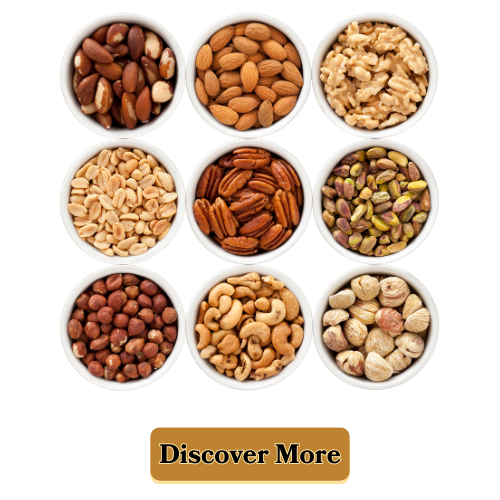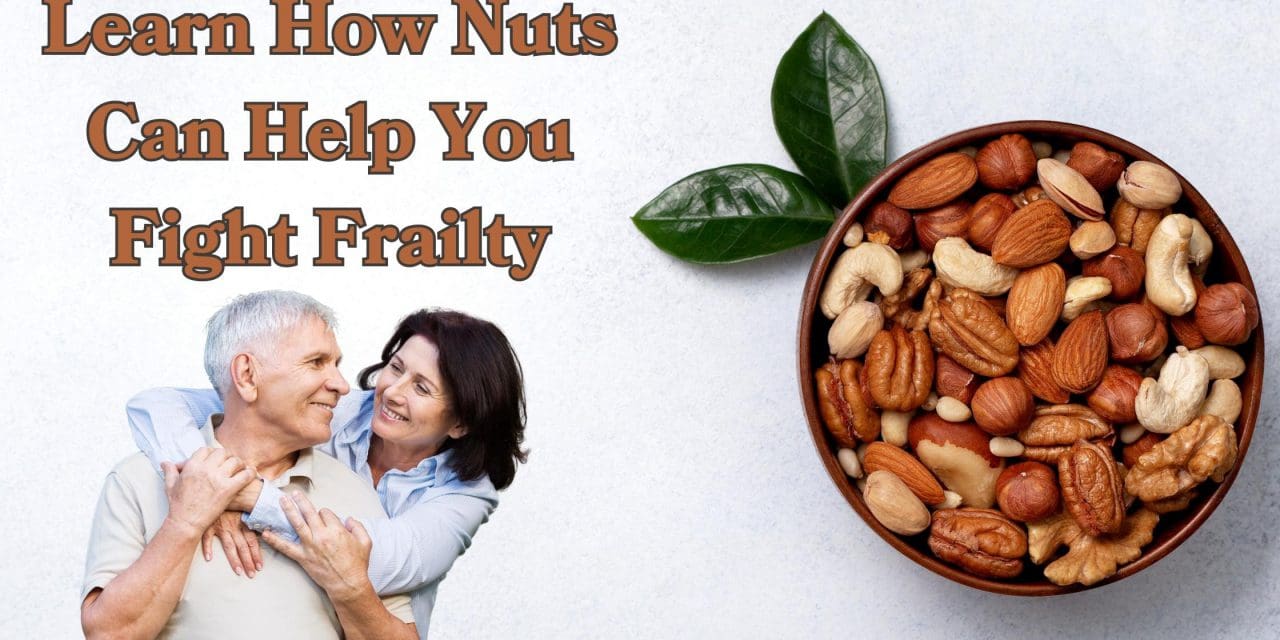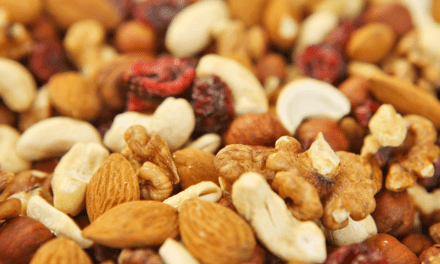Last updated 9 months ago | Originally Published: August 23, 2023
Exploring the Link Between Nut Consumption and Lower Frailty Risk
Frailty is a common concern for older adults, often leading to serious health outcomes like increased mortality and disability. It’s a condition that affects a significant portion of the aging population, making it a critical area for research and intervention.
A recent study in The Journal of Nutrition has shed light on a potential dietary solution. According to the research, long-term consumption of nuts is strongly associated with a lower risk of frailty among older women.
This blog aims to examine the key findings of this groundbreaking study. We’ll also discuss what these results could mean for enhancing the well-being of older adults.
The Prevalence and Risks of Frailty
Frailty is more than just a buzzword in geriatric medicine; it’s a pressing health issue that affects a considerable number of older adults in the United States. Characterized by a decline in physical function and increased vulnerability to adverse health outcomes, frailty is a condition that demands attention. Understanding its prevalence and associated risks can help us better target interventions and improve the quality of life for our aging population.
Frailty Statistics
The numbers paint a concerning picture. According to estimates, between 7-12% of Americans aged 65 and older are classified as frail. This percentage translates to millions of individuals who are at a heightened risk for a range of negative health outcomes.
The data underscores the need for effective strategies to combat frailty, especially as the population continues to age. With more people living longer, the absolute number of those at risk is likely to grow, making it imperative to find solutions that can help mitigate this issue.
Adverse Outcomes
Frailty isn’t just a matter of feeling weak; it comes with a host of serious consequences that can severely impact an individual’s quality of life. These outcomes range from increased mortality rates to heightened falls and surgery complications susceptibility. Let’s break down these adverse outcomes to understand the situation better.
- Mortality: Frail individuals have a higher risk of death compared to their non-frail counterparts. The weakened physical state often exacerbates other health conditions, leading to a higher mortality rate.
- Disability: Frailty is closely linked to a decline in functional abilities. Everyday tasks become increasingly difficult, leading to higher rates of disability among this group.
- Falls: The reduced physical strength and balance associated with frailty make falls more likely. These falls can result in serious injuries, further compromising health.
- Poor Surgical Outcomes: Frail individuals are more susceptible to complications during and after surgical procedures. This includes longer recovery times and a greater likelihood of post-operative issues.
Understanding these adverse outcomes is crucial for both healthcare providers and families. It highlights the urgency of finding effective interventions to reduce the risk of frailty and its associated complications.

The Role of Diet in Frailty
Diet plays a pivotal role in managing and reducing the risk of frailty. As we age, the importance of a balanced, nutrient-rich diet becomes even more critical. Recent research has highlighted the effectiveness of certain dietary patterns in mitigating the risks associated with frailty.
High-Quality Diets
One such dietary pattern that has gained attention for its health benefits is the Mediterranean diet. Rich in fruits, vegetables, whole grains, and healthy fats, this diet has been linked to a lower risk of frailty.
Studies suggest that adhering to a Mediterranean diet can improve physical function and reduce vulnerability to adverse health outcomes in older adults.
Nutritional Value of Nuts
Nuts are a standout component of the Mediterranean diet and for good reason. They contain essential nutrients like polyunsaturated fatty acids, vitamins, and anti-inflammatory phytochemicals.
These nutrients contribute to maintaining physiological functions that are crucial for preventing frailty. For example, the healthy fats in nuts can improve cardiovascular health, while their anti-inflammatory properties can help manage chronic conditions.
This makes nuts not just a tasty but also a nutritious addition to the diet, offering multiple benefits that could help reduce the risk of frailty.

Unpacking the Study’s Key Nutritional Findings
The research published in The Journal of Nutrition provides valuable insights into the relationship between nut consumption and frailty risk among older women. These findings could have far-reaching implications for dietary guidelines and public health interventions aimed at the aging population. Below, we explore these key findings in greater detail.
Main Findings
The cornerstone of this research is the robust association between higher nut consumption and reduced frailty risk in older women. This isn’t a minor correlation; the study found that the relationship remained strong even after adjusting for various health and lifestyle factors such as physical activity, overall diet quality, and medical history. This is significant to the idea that nuts could be a strategic dietary choice for combating frailty.
Consumption Details
The study goes beyond just stating that nuts are beneficial; it quantifies the benefit. According to the research, women who consumed 5 or more servings of nuts per week had an approximately 20% lower risk of developing frailty than those who consumed less than one serving per month. This is a substantial reduction and suggests that even moderate changes in diet could have a meaningful impact on health outcomes for older adults.
Linear Trend
Another intriguing aspect of the study is the linear relationship between nut consumption and frailty risk. This means that the benefits aren’t capped; the more nuts consumed, the lower the risk of frailty. This linear trend encourages ongoing dietary changes, as even small increases in nut consumption could offer incremental health benefits. It also opens the door for future research to explore the optimal quantity of nuts for maximum health benefits.
Types of Nuts
The study didn’t stop at just any nuts; it differentiated between types. While peanuts and walnuts showed a significant inverse relationship with frailty risk, peanut butter did not. This distinction is crucial because it suggests that the form in which nuts are consumed matters. Whole nuts offer more benefits than processed forms, possibly due to preserving their natural nutrient profile. This could be an important consideration for dietary recommendations, emphasizing the value of consuming nuts in their whole form.
By diving into these newer findings, we can better understand the potential role of nuts in reducing frailty risk. This information is not just academically interesting; it has real-world applications that could improve millions of older adults’ health and quality of life.

The Nutritional Benefits of Nuts in Reducing Frailty
Nuts aren’t just a convenient snack; they’re a nutritional powerhouse with specific benefits that could help mitigate the risk of frailty in older adults. In this section, we’ll explore the nutritional components of nuts and how they contribute to physiological functions crucial for preventing frailty.
Nutritional Profile
Nuts are rich in a variety of nutrients that are essential for maintaining good health. Before we list these nutrients, it’s important to understand that combining these elements works synergistically to offer multiple health benefits. Here are some key nutrients found in nuts:
- Polyunsaturated Fatty Acids: These are healthy fats that are essential for heart health and can reduce inflammation.
- Vitamins: Nuts are a good source of essential vitamins like Vitamin E, which is an antioxidant, and some B vitamins, which are crucial for energy metabolism.
- Anti-inflammatory Phytochemicals: These natural compounds have the ability to reduce inflammation, which is often a contributing factor to chronic diseases.
Overall, the diverse nutritional profile of nuts makes them more than just a convenient snack option. They’re a multi-nutrient food source that can contribute to a balanced diet, offering a range of health benefits that are particularly relevant for older adults at risk of frailty.
Combining polyunsaturated fats, essential vitamins, and anti-inflammatory compounds provides a holistic approach to health, making nuts a worthy addition to any diet to reduce frailty risk.
Physiological Benefits
The nutrients in nuts do more than just fulfill daily dietary requirements; they play a vital role in maintaining physiological functions that can stave off frailty.
For instance, polyunsaturated fatty acids are known to improve cardiovascular health, which is often compromised in frail individuals.
The anti-inflammatory phytochemicals can help manage chronic conditions common in older adults, reducing the overall disease burden and, thereby, the risk of frailty. Vitamins like Vitamin E contribute to cellular health, protecting against oxidative stress, a known factor in aging.
In summary, the nutrient-rich profile of nuts makes them an excellent dietary choice for older adults looking to reduce their risk of frailty.

Study Limitations and Avenues for Future Research
While the study provides valuable insights into the role of nuts in reducing frailty risk, it’s essential to consider its limitations and the opportunities for future research. This will help us understand the full scope and potential applicability of the findings.
Study Limitations
The study does have some constraints that should be acknowledged. For instance, the focus was primarily on older women, which raises questions about the generalizability of the findings to older men or younger populations. Additionally, the study concentrated on specific types of nuts like peanuts and walnuts, leaving out a range of other nut varieties that could also have health benefits.
Future Research Avenues
Before we list potential areas for future research, the study opens up several exciting possibilities for further exploration. Here are some suggestions:
- Gender Differences: Investigate if the benefits of nut consumption extend to older men or other age groups.
- Variety of Nuts: Explore the health benefits of other types of nuts not covered in the original study.
- Public Health Interventions: Test the feasibility of using nuts as a public health strategy to reduce frailty on a larger scale.
All in all, while the study offers promising insights, there are limitations and gaps that future research could address.
This could include expanding the demographic focus, exploring different types of nuts, and assessing the potential for nuts as a broader public health intervention.
These future studies could provide a more comprehensive understanding of how nuts could effectively combat frailty in diverse populations.

Practical Tips and Accessibility of Nuts for Reducing Frailty Risk
The research findings on the relationship between nut consumption and reduced frailty risk offer more than just theoretical knowledge; they present actionable insights that can be applied in everyday life.
For older adults concerned about frailty or anyone interested in a nutrient-rich diet supporting long-term health, nuts can be a convenient and versatile option. They can be easily incorporated into meals, used in cooking, or consumed as snacks.
In this section, we’ll go beyond the science to offer practical ways to make nuts a regular part of your diet and discuss why they are a convenient and accessible food choice.
Dietary Tips
Incorporating nuts into your daily routine doesn’t have to be complicated. Here are 7 tips to help you make this nutritious food a regular part of your diet:
1. Snack Smart: Replace unhealthy snacks like chips or sugary treats with a handful of nuts.
2. Smoothie Boost: Add a spoonful of nut butter to your morning smoothie for added nutrients and flavor.
3. Salad Topping: Sprinkle some almonds or walnuts over your salad to add crunch and nutritional value.
4. Baking: Use ground nuts as a healthier alternative to flour in muffins, pancakes, or bread recipes.
5. Nut Milk: Consider making your own nut milk at home using almonds or cashews as a dairy-free alternative.
6. Meal Prep: Pre-portion nuts into small containers or ziplock bags for an easy, on-the-go snack.
7. Nut Butter: Opt for natural, unsweetened nut butter and use it as spreads or in cooking.
In summary, these tips offer a variety of ways to include nuts in your diet, making it easier to reap the health benefits they offer, especially in the context of reducing frailty risk.
Convenience and Accessibility
Nuts aren’t just nutritious; they’re also highly convenient and accessible. Indeed, they’re available in most grocery stores, health food shops, and even online marketplaces.
One of the best places to buy nuts is right here at Candy Retailer! We offer a vast selection of nuts in various packaging options, including cans, pouches, and 1lb resealable bags. You can check out all our nuts here.
Their long shelf life makes them a practical choice for stocking up, reducing the frequency of shopping trips. This is especially beneficial for older adults who may have mobility issues.
Additionally, nuts require no preparation. They can be eaten as is, straight out of the package, or used in simple recipes that don’t demand much time or cooking skills. This makes them an ideal dietary option for people with busy lifestyles and those who may find cooking challenging.
With a range of types and flavors available, from almonds and walnuts to cashews and pecans, there’s a nut to suit every taste preference, making it easier to maintain a varied and enjoyable diet.

Ending Notes on Nut Consumption and Frailty
Today, we discussed the relationship between nut consumption and frailty risk, particularly in older adults.
We’ve discussed the prevalence and risks associated with frailty, the role of high-quality diets like the Mediterranean diet in reducing frailty risk, and the specific nutrients in nuts that contribute to their health benefits.
We also looked at a recent study’s key findings that strongly associate higher nut consumption with lower frailty risk among older women.
Plus, we offered practical tips for incorporating nuts into one’s diet were provided, along with a discussion on the convenience and accessibility of nuts as a dietary option.
Furthermore, we informed you that Candy Retailer offers a wide variety of nuts in convenient packaging, making it easier than ever to include this nutritious food in your diet.
In conclusion, the potential benefits of nut consumption go beyond mere nutritional value. The evidence suggests that regular consumption of nuts could be a simple yet effective strategy for lowering the risk of frailty among older adults.







Recent Comments